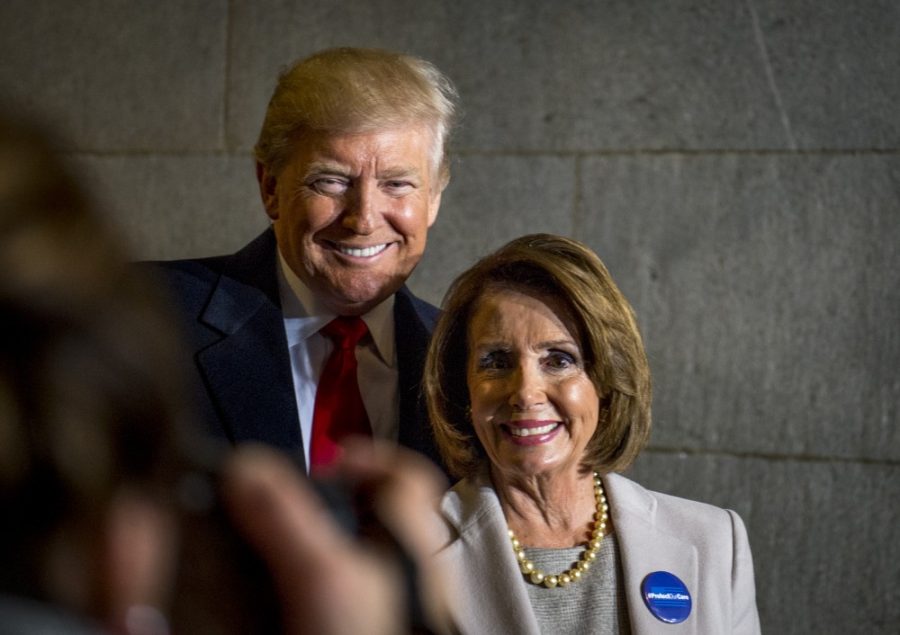After months of stepping on every Democrat toe he could find in the capital, President Trump is starting to look across the aisle in the face of stiffening opposition by the Republican leadership against his less cut-and-dry policies. If Democrats were told half a year ago that Trump would not only be interested in hearing their input but also be willing to soften his famously direct illegal immigration stance and even temporarily stop pushing for a border wall, they likely would have keeled over laughing at the insanity of it.
But it seems Trump’s promised restructuring of the American political scene was much more subtle, and unpredictable, than originally thought.
In a change of posturing, President Trump has sat down and agreed to negotiate with Democrats on immigration and raising the debt ceiling, both of which fly directly in the face of the Republican leadership. House Speaker Paul Ryan specifically described the deal struck by house Democrats to raise the debt ceiling as “ridiculous” just days before Trump gave it his seal of approval.

When Democrats seemed more willing than Republicans to talk terms over the phasing out of the Deferred Action for Childhood Arrivals program, Trump wasted no time jumping from the divided, bickering house Republicans to the surprisingly receptive Democrats. According to Reuters, he even “honored a request by Nancy Pelosi, the top House of Representatives Democrat, to publicly reassure the Dreamers they do not face imminent deportation.”
Even more interesting, Chuck Schumer, the Senate minority leader and a leading Democrat, has sparked up something of an odd friendship with the controversial president. Their meetings have been described by Senator Peter King as being “a love-in,” full of laughter, nods of agreement and a apparent genuine respect between the two.
First Trump campaigns on the idea of wiping away, in broad strokes, the legacies of Democrat bills signed into law under former President Obama, and now he’s cozying up to Pelosi and Schumer, the architects of those same despised bills. So what gives? Has the president evolved into something new?
RELATED: Opinion: North Korea’s gamble
While these three events may inspire confidence in Democrats and terror in Republicans, there is nothing new under the sun. It seems that despite his constant refrain of “I am not a politician,” political experts can’t help but try to analyze him like one.
The president does not view politics the same way as Pelosi or Ryan do, because he is not a man of ideology. According to Representative Adam Schiff, “[Trump’s] not conservative. He’s not liberal … The only consistent theme seems to be he’s pro-Trump,” which represents his hyper-personal governing style. Rather than seeing ideological lines in the sand he can’t cross, Trump is about getting results or, as it’s often sold to his audience, “making deals.”
Contributors writing for CNN hypothesized that Trump’s eagerness to negotiate with Democrats may have been influenced by his desire to clear the table of side issues so he could focus Congress on passing his pet issue of tax reform. CNN wrote, “A senior White House official said Trump went into Wednesday’s meeting eager to cut a deal that would clear the way for tax reform.” This tit-for-tat kind of deal-making is highly reminiscent of older political machines and the more reciprocal structure of business management.
RELATED: Opinion: Hail to the chief
Even Trump’s relationship with Schumer is representative of his reliance on a personal and mercurial kind of politics that encourages getting something done, even if it’s not exactly what he wanted. Joking in front of the Al Smith dinner, Trump said, “[Schumer] used to love me when I was a Democrat,” which should show any observer just how little concern the president has for party politics.
In the end, it seems Trump doesn’t care about the tedium of political theory, and according to Politico, neither do many of his supporters. When a Morning Consult / Politico poll asked about the President’s decision to negotiate the end of DACA with Democrats, a whopping two-thirds of the president’s base supported allowing them to stay in the country. Even Sheriff Arpaio, the divisive sheriff of Maricopa County who had been the subject of a racial profiling investigation and is well-known for his hard-line stance on illegal immigration, struck a conciliatory tone in response to Trump’s decision, saying, “He’s trying to make deals and get stuff done.”
While at first glance President Trump appears to be running a new ship, upon closer inspection it becomes obvious that the president simply represents a more chaotic and personal administration than we are used to seeing. While this approach to accomplishing the divisive and slow-moving may be untested, if it continues along the same bipartisan path as it has so far, maybe a little chaos is a small price to pay for a much-needed rapprochement in the capital.
Follow the Daily Wildcat on Twitter









